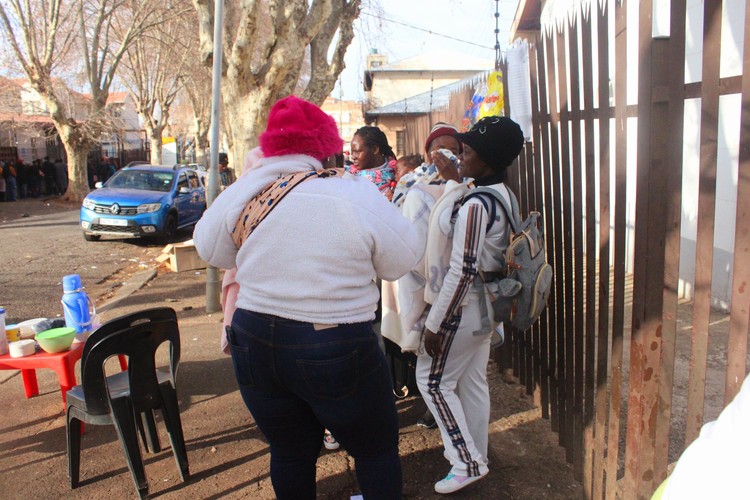Joburg clinic staff make me ashamed to be an immigrant
Each time I take my daughter to the clinic, immigrants are told to wait while South Africans are served first
A group of immigrant women standing to one side at Jeppe Clinic on the instructions of Operation Dudula members. Archive photo: Kimberly Mutandiro
In recent months, the anti-immigration group Operation Dudula has been turning away immigrants from government clinics in Gauteng. They claim to be targeting only “illegal” migrants. An asylum seeker with valid papers shares her experience at a Johannesburg clinic, where health workers appear to be complicit in Dudula’s bidding.
My recent trips to the local clinic for my daughter’s immunisations have left me full of fear, anxiety, and hopelessness.
Is this the new reality for immigrants in South Africa? It feels like it is just a matter of time before we witness another surge in violence and death.
It appears that all foreigners, whether documented or undocumented, have now been lumped together and deemed unwanted by Operation Dudula. Its members have been protesting at government clinics across Johannesburg, preventing foreigners from getting services at health facilities.
I am an asylum seeker with a valid permit. My daughter was born 15 weeks ago in a public hospital in Johannesburg, and her birth was registered there. I was told to go to the Esselen Street Clinic on specific dates for her to get vaccinated.
Both times that I took her to the clinic, in June and July, the clinic staff were monitoring the number of immigrants and South Africans served. The immigrants were told to wait until all the South Africans in line were served, before we could be helped.
I felt ashamed to be in this situation. I was not treated with dignity and respect.
I was 16 years old when, in 2006, my siblings and I left Zimbabwe to come to South Africa. We did not do it “for the fun of it”. I was a minor, and the move was traumatic. I left behind everything I knew to come here. It was a massive culture shock. I had to quickly adapt to a new school, a new syllabus, a new language.
In 2008, I was in grade 11 when massive xenophobic attacks took place across the country. It was a scary period, seeing it on the news, staying cooped up indoors out of fear.
I’ve been here for 19 years, but it doesn’t feel like home. Zimbabwe doesn’t feel like home. It is only a distant memory. I feel like someone who has no roots. I feel for my children because I wonder what the future holds for them.
I am self-employed, baking and selling special occasion cakes while also helping my husband manage his event equipment company.
But at the end of the day, I don’t blame the South Africans. They have every right to be angry because of the narrative that is pushed on social media and by leaders who claim “foreigners are taking all the jobs”, to gain votes.
At the end of the day, it’s people higher up the food chain who are pitting us against each other — using us as a scapegoat for unemployment. It’s a sad situation.
The asylum seeker asked to be anonymous. She contacted us via email. GroundUp staff have fact-checked her story.
Support independent journalism
Donate using Payfast

Don't miss out on the latest news
We respect your privacy, and promise we won't spam you.
Next: Gambling boss quits after forensic audit
Previous: Hundreds of households in Kariega left in the dark
© 2025 GroundUp. This article is licensed under a Creative Commons Attribution-NoDerivatives 4.0 International License.
You may republish this article, so long as you credit the authors and GroundUp, and do not change the text. Please include a link back to the original article.
We put an invisible pixel in the article so that we can count traffic to republishers. All analytics tools are solely on our servers. We do not give our logs to any third party. Logs are deleted after two weeks. We do not use any IP address identifying information except to count regional traffic. We are solely interested in counting hits, not tracking users. If you republish, please do not delete the invisible pixel.

